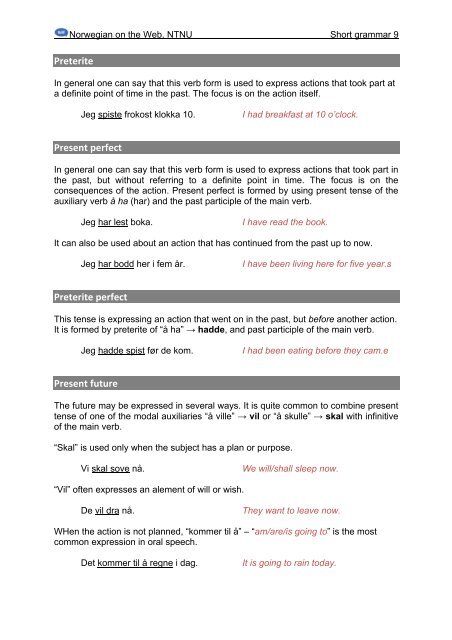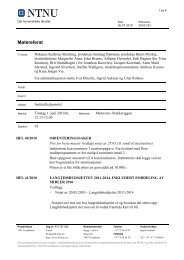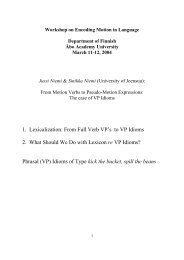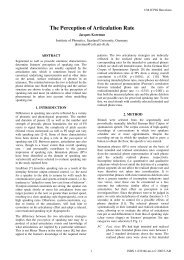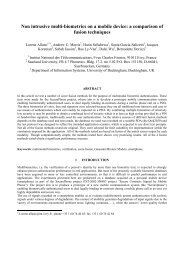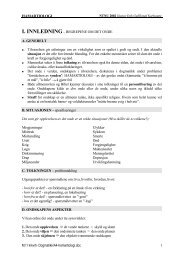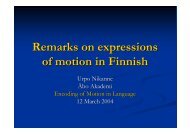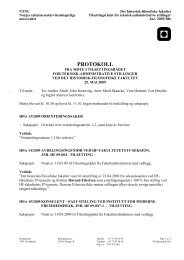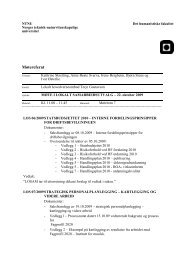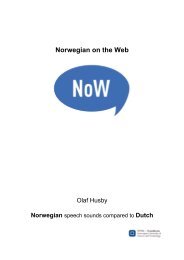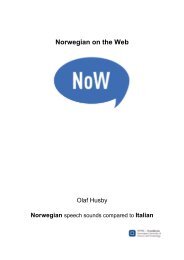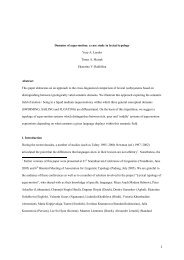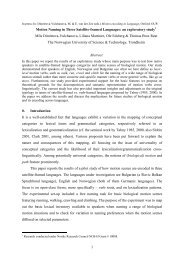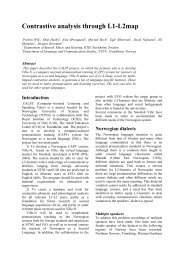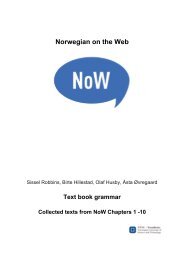Norwegian on the Web - Short grammar - NTNU
Norwegian on the Web - Short grammar - NTNU
Norwegian on the Web - Short grammar - NTNU
Create successful ePaper yourself
Turn your PDF publications into a flip-book with our unique Google optimized e-Paper software.
<str<strong>on</strong>g>Norwegian</str<strong>on</strong>g> <strong>on</strong> <strong>the</strong> <strong>Web</strong>, <strong>NTNU</strong> <strong>Short</strong> <strong>grammar</strong> 9<br />
Preterite <br />
In general <strong>on</strong>e can say that this verb form is used to express acti<strong>on</strong>s that took part at<br />
a definite point of time in <strong>the</strong> past. The focus is <strong>on</strong> <strong>the</strong> acti<strong>on</strong> itself.<br />
Jeg spiste frokost klokka 10.<br />
I had breakfast at 10 o’clock.<br />
Present perfect <br />
In general <strong>on</strong>e can say that this verb form is used to express acti<strong>on</strong>s that took part in<br />
<strong>the</strong> past, but without referring to a definite point in time. The focus is <strong>on</strong> <strong>the</strong><br />
c<strong>on</strong>sequences of <strong>the</strong> acti<strong>on</strong>. Present perfect is formed by using present tense of <strong>the</strong><br />
auxiliary verb å ha (har) and <strong>the</strong> past participle of <strong>the</strong> main verb.<br />
Jeg har lest boka.<br />
I have read <strong>the</strong> book.<br />
It can also be used about an acti<strong>on</strong> that has c<strong>on</strong>tinued from <strong>the</strong> past up to now.<br />
Jeg har bodd her i fem år.<br />
I have been living here for five year.s<br />
Preterite perfect <br />
This tense is expressing an acti<strong>on</strong> that went <strong>on</strong> in <strong>the</strong> past, but before ano<strong>the</strong>r acti<strong>on</strong>.<br />
It is formed by preterite of “å ha” → hadde, and past participle of <strong>the</strong> main verb.<br />
Jeg hadde spist før de kom.<br />
I had been eating before <strong>the</strong>y cam.e<br />
Present future <br />
The future may be expressed in several ways. It is quite comm<strong>on</strong> to combine present<br />
tense of <strong>on</strong>e of <strong>the</strong> modal auxiliaries “å ville” → vil or “å skulle” → skal with infinitive<br />
of <strong>the</strong> main verb.<br />
“Skal” is used <strong>on</strong>ly when <strong>the</strong> subject has a plan or purpose.<br />
Vi skal sove nå.<br />
We will/shall sleep now.<br />
“Vil” often expresses an alement of will or wish.<br />
De vil dra nå.<br />
They want to leave now.<br />
WHen <strong>the</strong> acti<strong>on</strong> is not planned, “kommer til å” – “am/are/is going to” is <strong>the</strong> most<br />
comm<strong>on</strong> expressi<strong>on</strong> in oral speech.<br />
Det kommer til å regne i dag.<br />
It is going to rain today.


